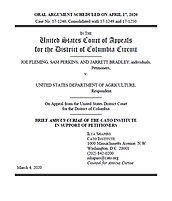Learn more about Cato’s Amicus Briefs Program.
In a word, the Appointments Clause is about accountability. It’s a constitutional limit on the diffusion of power, so the public can know where the proverbial buck stops. To this end, the clause establishes a chain of command, whereby inferior officers report to principal officers, who answer to the president.
Because it is rife with Appointments Clause violations, the Department of Agriculture’s anomalous enforcement regime is a quagmire of political accountability. When the Agriculture Department prosecutes someone in-house, the case is heard by an inferior officer, known as an Administrative Law Judge (“ALJ”), whose decisions are reviewed by another inferior officer, known as the Judicial Officer. Yet the Constitution doesn’t permit such a sideways chain of command.
Unfortunately, the confusion runs even deeper. Although an ALJ’s decisions are reviewed by the Judicial Officer, a different official—the Agriculture Secretary—has the power to fire an ALJ. Here, however, the Secretary doesn’t have final say; rather, he can merely initiate removal proceedings against an ALJ, while the ultimate decision is made by a different agency (the Merit Systems Protection Board).
This unusual enforcement regime makes hash of constitutional accountability. Does the buck stop with the Judicial Officer that reviews an ALJs initial decision? Or does it stop with the Secretary, who admits to secretly influencing the Judicial Officer behind the scenes, and who can initiate removal proceedings against ALJs? Or does it stop with the Merit System Protection Board, which renders the final determination on an ALJs removal? Who knows?
In 2017, three midwestern horse trainers (Joe Fleming, Sam Perkins, & Jarrett Bradley) entered this Kafkaesque realm when the Agriculture Department alleged violations of the Horse Protection Act and sought punishments including civil fines. After the agency ruled against them, they sought judicial review in the U.S. Court of Appeals for the D.C. Circuit. While their case was pending, the Supreme Court issued its watershed decision in Lucia v. SEC, which held that ALJs are “inferior officers” under the Appointments Clause. In response to that decision, the D.C. Circuit ordered supplemental briefing.
In a brief filed today supporting the petitioners, Cato advances two arguments. First, we explain why the three ALJs at the Agriculture Department wield exceptional authority among the almost 2,000 ALJs currently employed by the federal government. Second, we explain that this program’s constitutional flaws are too interconnected to allow for half measures, such as severing Agriculture ALJs’ removal protections. To fix everything with one order, the court would have to rewrite the statute. Addressing the Agriculture Department’s unconstitutional enforcement scheme is a job for lawmakers, not judges.

This work is licensed under a Creative Commons Attribution-NonCommercial-ShareAlike 4.0 International License.


